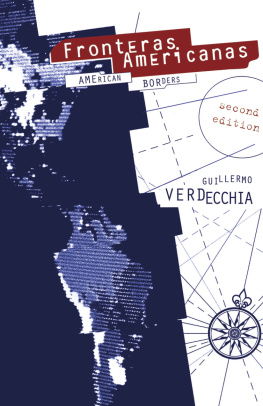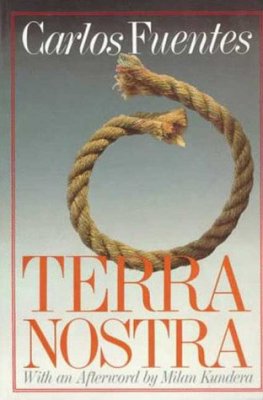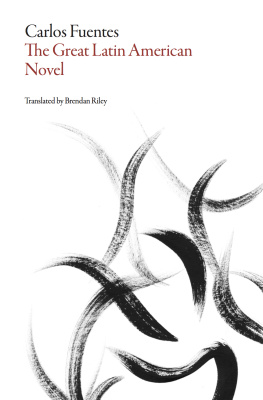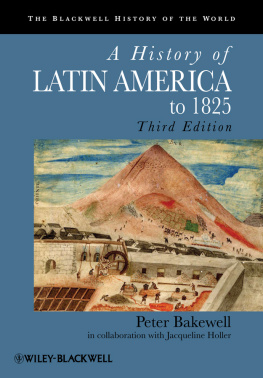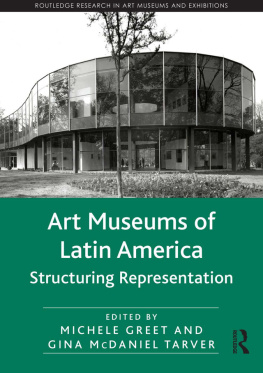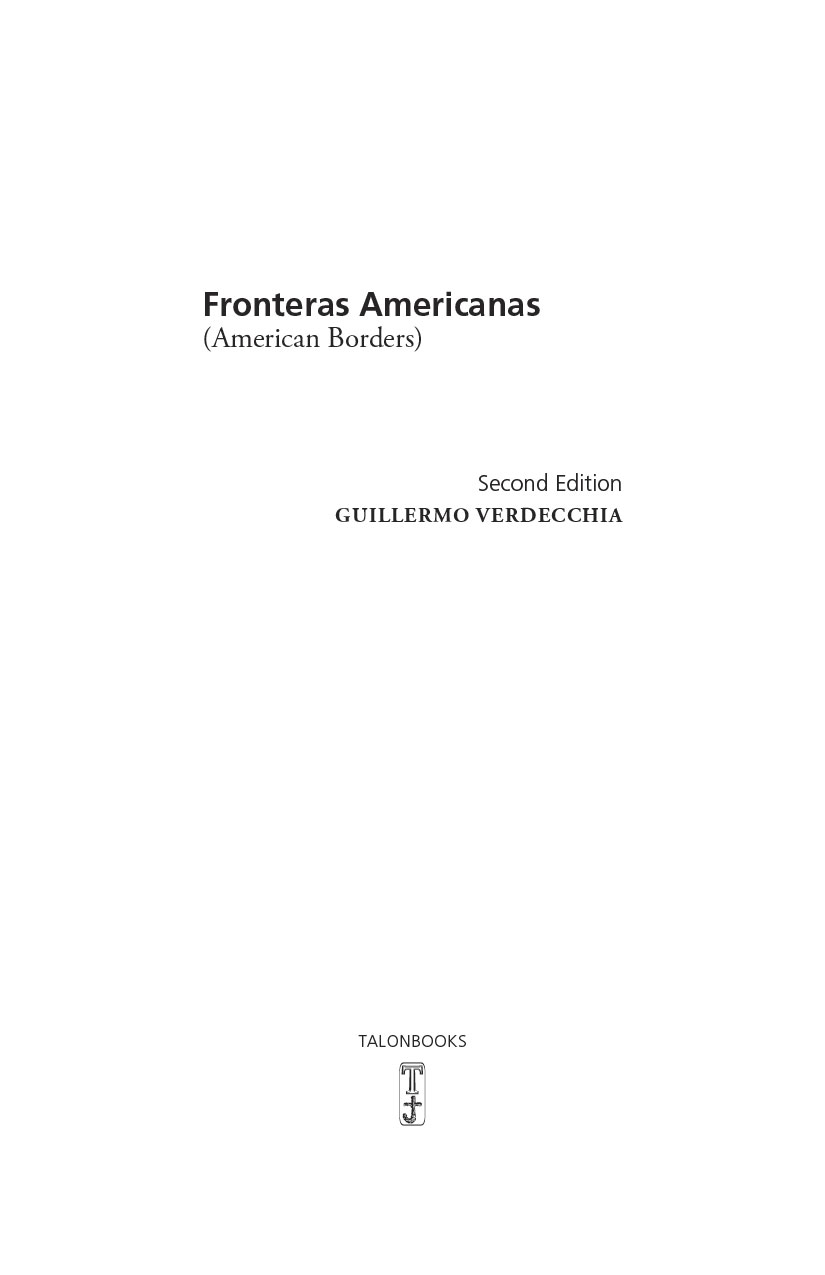If you came across this e-book by some other means, feel free to purchase it and support our hard work. The print edition is also available.
Talonbooks is a small, independent, Canadian book publishing company. We have been publishing works of the highest literary merit since the 1960s. With nearly 500 books in print, we offer drama, poetry, fiction, and non-fiction by local playwrights, poets, and authors from the mainstream and margins of Canadas three founding nations, as well as both visible and invisible minorities within Canadas cultural mosaic.
Learn more about us here.
Foreword
When my family came to Canada, the designation for us was displaced persons, usually shortened to DPs and often alliteratively decorated with dirty. Other decades have produced their own formulations of national otherness: immigrants and foreigners, refugees and aliens, newcomers and new Canadians. Terminology apart, these peoples journeys are all different and all the same. Fronteras Americanas is a vivid and arresting theatre piece drawn from its creators own singular migration. But Guillermo Verdecchia both de-constructs and re-constructs the model in his personal meditation on displacement, and indeed, in his celebration of it.
Guillermo Verdecchias own origins are Latin, and his agenda here is the investigation of the Latino stereotypes and received notions that get in the way of true perception. The playwrights dossier overflows with devastating data from pop culture, tourist guides, lifestyle journalism, commercials, advertising, and supermarket shelves. Historical briefings and quizzes and lectures both mock and unmoving-eyeball serious share the platform with audio and visual samples. He annotates furiously, flicking political, historical, linguistic, musical, moral, sexual, even Terpsichorean challenges at us as we scramble to gain a foothold in his demanding new topography. His range of references is vast and truly pan-American: Federico Garca Lorca and Ricky Ricardo, made-for-TV drug-cartel movies and Carlos Fuentes, the Zoot Suit Riots and Chico and the Man , stor Piazzolla and Speedy Gonzales, Free Trade and Simn Bolvar, Eva Pern and the Frito Bandito. Just as rejoicing in diversities forms the basis of the works content, so, too, diversity is the guiding principle of its form.
The broad range of the playwrights dramatic territory is held together by the tension at the heart of his discourse: the dialogue between his two stage personae, Verdecchia and Wideload (a.k.a. Facundo Morales Segundo). Together these two weave the many narrative, reflective, dialectic, and personal strands of Fronteras Americanas . Wideload, an inflated stereotype designed to deflate stereotypes, is a shrewdly witty commentator. He ponders Saxonian attitudes, turns Latino clichs on their sombreros, and even challenges the play itself, offering dramaturgy and criticism from inside the action. He is both a lit match and a safety curtain for the more volatile range of Verdecchia, and there are no prizes for guessing who he is. Verdecchias reflections move from humiliation at the hands of both education and entertainment systems to the shock and horror of what he experiences on his return to South America. Through Verdecchia, the playwright extends his grasp to the poetic in the emotional meaning beneath the tangos angularity and to the mystical in his spiritual search for integration.
Fronteras Americanas is dazzlingly animated by Guillermo Verdecchias intelligence, wit, and curiosity. But the satiric, the sardonic, and the ironic are all counterweighted by the extraordinary personal candour of the writing. It is here in Guillermo Verdecchias brave commitment to the truth of Verdecchia that the work opens up and absorbs common experiences. Displacement is his theme, with many variations: displacement from ones history, from ones past, from ones surroundings, from oneself. Telling his story, the playwright tells all our stories. How we are torn apart by the conflicting impulses to belong and to remain separate. How we allow ourselves to yield to the same suspicion with which we have been treated. How we want to both stand out and disappear. How we betray ourselves, giving away our very names for the quick trade-off of pronunciation ease and acceptance. How we flirt with self-hatred through our fears (I know that somewhere in my traitorous heart I cant stand people I claim are my brothers).
Guillermo Verdecchias struggle towards his self shapes the dramatic movement of Fronteras Americanas : it is the border within himself that must be crossed. Like all true artists, he embraces the paradox. He takes us with him: And you? Did you change your name somewhere along the way? Does a part of you live hundred or thousands of kilometres away? Do you have two countries, two memories? He urges a new geography of the mind and spirit, quoting Octavio Paz: I am not at the crossroads / to choose / is to go wrong. If uncontrolled displacement was the pattern of the past, willed displacement will be the remedy of the future.
URJO KAREDA , July 1993
Preface to the Second Edition
As we were coming down the stairs together at the Young Centre, Albert Schultz, the artistic director of Soulpepper Theatre in Toronto, asked me, What about doing Fronteras here next season? Alberts charm is difficult to resist, and so, instead of deflecting the question or politely turning down the invitation as I had done in the past, I said Id think about it.
I wrote and first performed Fronteras Americanas a lifetime ago. (Our daughter was born the day the play received the Governor Generals Award. She is now in her first year of university.) Writing and performing the play back then was a way to work out some questions that had troubled me for a long time, a way to determine, as I put it in an early grant application, where I lived. After performing the play for a couple of years, I felt like Id solved the problem. I didnt need the play any longer, so I stopped doing it. Others performed it in Canada and abroad, while I moved on to other questions, other plays.
Still, I found, no matter where I went to work or to speak or to read, many people continued to respond to Fronteras and its proposals. Most recently, in Cologne, Germany, a group of students approached me after a reading, among them a young woman from a Turkish family residing in Germany. She was clearly surprised, moved, by what she heard in my reading. She said that the play felt like her experience in Germany, and wanted to know more about it.
I remembered that young woman when I was considering whether or not to mount a production of Fronteras at Soulpepper. I also thought of Lukas Podolski, the Polish-born German striker who refused to celebrate his goals against Poland and explained, I have two hearts beating inside me. Why not do the show again? There are, after all, people all over the globe living, crossing, resisting, defining, and defending linguistic, cultural, racial, gender, psycho-geographical, cartographic, political, and other borders. While the world has changed in many ways since I first wrote and performed Fronteras , the processes of migration, displacement, and globalization that informed the plays creation have only accelerated. Some of us may lead more networked lives now, but the Border is alive and well and living all over the globe. The Border trope I stumbled over back then and there remains meaningful, as many kind listeners and audience members have told me.

